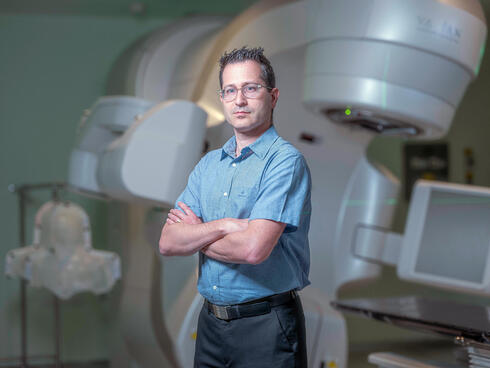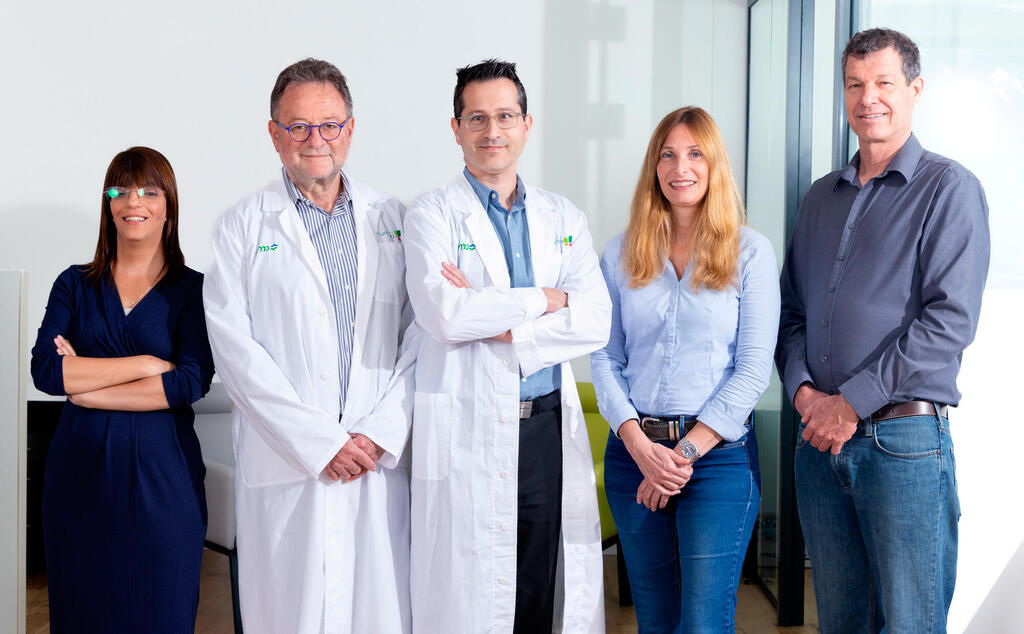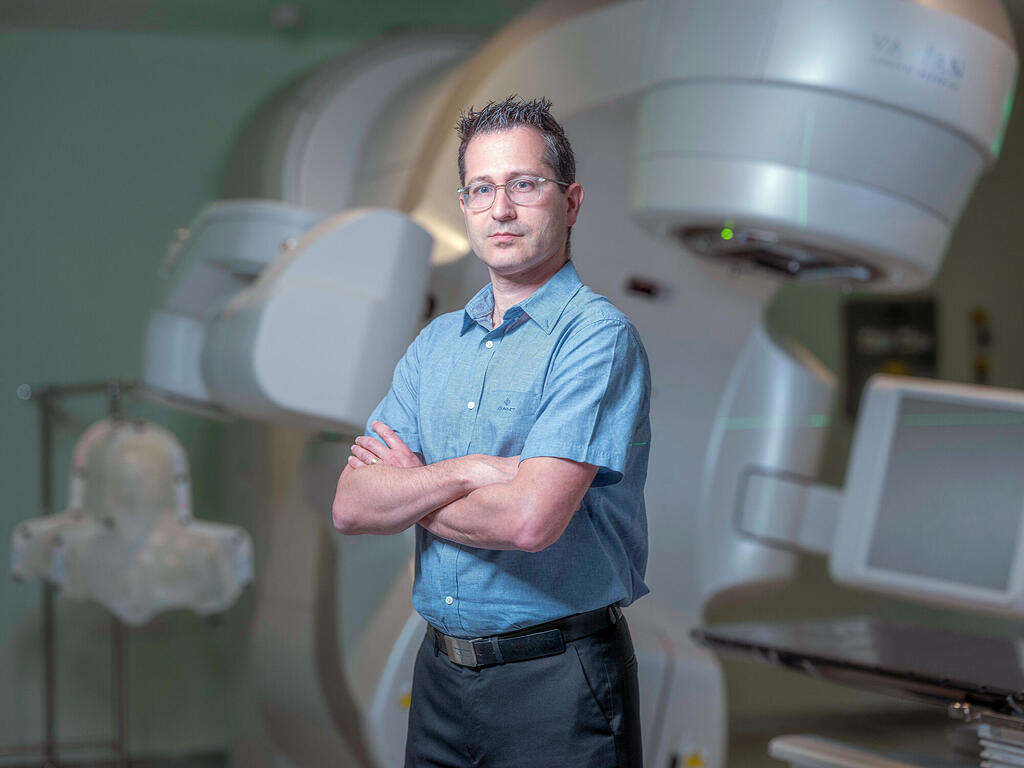
Interview
Israeli biotech phenom puts death knell on cancer
At 44, Gal Markel is a biotech bulldozer. After a $95 million exit, the professor of immunology serves as the Deputy Director General of Beilinson Hospital and the Director of the Davidoff Cancer Center, and is also involved in five startups. Now he has raised around $33 million to establish the Samueli Institute, researching ways to help the immune system eradicate cancer cells
"If you build it, they will come." This is the philosophy that guides biotech entrepreneur Prof. Gal Markel, and it is not taken from a business administration book or from an inspiring story from hospital corridors, but rather from the movie "Field of Dreams", in which Kevin Costner plays a farmer from Iowa, who hears this sentence over and over again when working in his cornfield, calling him to build a baseball field. "The meaning of this is: 'You start, then people will join and it will grow,'" explains Markel in an interview from his office in the Davidoff Center, where from the window behind him, strangely enough, a statue of Spider-Man standing on the roof of Schneider Hospital can be seen. His determination and vision were always there, and they turned him into a phenom.
Here is a quick summary of the 44-year-old Markel’s remarkable success to date: At the age of 26, he completed a doctorate in immunology with top honors and within four years he was appointed as the chief scientist of The Ella Institute for Treatment and Research of Melanoma at the Sheba Medical Center. At the age of 35 he became the youngest ever professor at the Faculty of Medicine of Tel Aviv University (and later also completed a master's degree in business administration). In the same year, he also made an impressive exit, when the German pharmaceutical giant Merck purchased a breakthrough antibody he had developed to eradicate various types of cancer, for $95 million upfront and another $510 million in milestone payments.
Today, six years later, Markel is already the Deputy Director General of the Rabin Medical Center, Director of the Davidoff Cancer Center, and these days he’s unveiling a new baby, the Samueli Integrative Cancer Pioneering Institute, which merges a biotech incubator with a university research institute and boasts a business culture and key performance indicators (KPIs).
The institute was established thanks to a donation of around $33 million, raised by Markel from the Samueli Foundation, founded by Dr. Henry Samueli, founder and chairman of the chip giant Broadcom, and his wife Dr. Susan Samueli. This is an unusual donation, not only in scope, but also in its essence. In complete contrast from the typical philanthropy in the public health system, which is often dedicated to the purchase of equipment or the construction of a building, on which the donor's name is emblazoned, the Samueli Foundation's contribution is a kind of particularly generous research grant, which is not time-bound. "It will be an organization similar to a startup," explains Markel, "and the intention is to succeed in creating, through some of our activities, intellectual assets, services, and agreements that will enable the future existence of the institute, and not rely only on additional donations."
According to Markel, the aim of the institute is to bring about a "deep paradigm shift in the way we see and treat cancer patients" by promoting research that deals not only with the genetics and biology of the disease, but also with aspects of the patient, what is known as integrative treatment. And Markel takes this integrative treatment one step further: "My approach is the opposite of conventional," he explains. "We will not say, 'Come tell me what the mutation is and we will develop a cure for it,' but on the contrary: we have a cure, let's change the human, that is, we will create a situation where the person is better suited to the medicine." How? In a variety of ways - from a ketogenic diet, which will affect the metabolism, to fecal transplantation to change the patient's microbiome. All relying on experiments that will discover which physical changes will increase the effectiveness of different anti-cancer treatments.
The institute already has two concrete goals on its agenda: research in the field of cellular therapy, which uses engineered lymphocytes to attack the tumor; and developing tools to increase the involvement of oncology patients in various parts of the patient journey, to improve their life expectancy and quality of life. "We have already established a unit that covers the patient's journey from A to Z," explains Markel, "from the administrative-bureaucratic aspect, through proactive and empathetic communication, to optimizing what the patient needs, among other things because we have the ability to map and investigate areas that are hidden from the medical file, and see where can we do things better."
One of the institute's unique advantages is the massive amount of information at its disposal. "We are part of the Clalit Health Services HMO, which means that we have access to medical documents of patients not only in the hospital, but also in the community. This is in line with the holistic vision of the Samueli Foundation, which aims to combine biology, medicine, behavioral sciences, data science, and artificial intelligence to create a better reality."
The exit and the aftermath
Markel lives with his spouse Lee, an orthodontist, and their four children in Ramat Efal. He was born and raised in Haifa, the son of Ariel, a special education teacher, and Shlomo, until two years ago the vice president of Broadcom - the same Broadcom owned by Dr. Samueli. "I've known Gal for more than 20 years," says Samueli. "I watched him grow up, also professionally, and I think his approach is innovative in an extraordinary way. So it is completely coincidental that I know Gal via his father Shlomo, because quite independently, he was on the radar of our foundation, which located global activities in the field. What motivated our gift is our belief that he can live up to the promise in regards to the foundation's vision."
Markel achieved most of his publicity thanks to the revolutionary cancer treatment he sold to Merck. The immune system deals with cancer cells all the time, but has difficulty dealing with cancer cells in tumors, because they create an “invisibility cloak”, which prevents the system from recognizing and attacking them. Markel recognized that the CEACAM1 protein is very prominent in the disappearance of melanoma cancer and tumors in the pancreas, intestines and stomach, and developed an antibody that neutralizes it, thus exposing the tumor to the immune system, which can then attack it.
"In 2010 we founded cCAM, in 2014 we entered clinical research, and in 2015 the company was sold," he says. But then, unexpectedly, the revolutionary development was halted - in less than a year and a half, Merck decided to stop further clinical development of the potential drug. Apparently, the effect of this drama on the course of his career was, if at all, minimal. But beneath the surface, it left a mark on him. "I learned from that that when you sell something, it's not yours anymore," he says. "It sounds stupid and trivial, but only when it happens to you, you understand what it means. I don't blame Merck for telling me 'Sure, we'll keep in touch with you' - and then didn't. That's how they work, it's their right, and they don't owe me anything. And yet it took me a while to put my ego aside, to understand that they weren’t insulting me."
Merck told Calcalist that it decided to stop the development after "no meaningful efficacy signals were detected" in the initial phase 1 dose-ranging. The decision to discontinue further development is not due to any known safety risks."
According to sources in the biotech industry, this is a rather vague reason, certainly when it comes to a clinical trial at such an early stage, the purpose of which is mostly to rule out safety issues. Markel agrees. "To say that no signs of effectiveness were observed at such an early stage... the medicine was simply not given a real chance. If there was a fundamental problem, we would have known about it, Merck would have alerted us."
Some argue that Merck bought your development just to kill it, because it competes with Keytruda, its flagship drug. What do you think about this?
"I don't like conspiracy theories. I don't have anything smart to say beyond that, it's not the first or tenth case where things like this happen for a variety of reasons. Keytruda itself is a drug that was almost shelved. I don't think anyone said 'let's stop it so it doesn't compete with Keytruda’. It is more likely in my opinion that a decision was made based on a general assessment of the company's situation, also with reference to its other assets, which are in various stages of development. This is the uninteresting reality that usually occurs."
What would you do differently today?
"I don't think I would have done anything differently today, and there is little value to hindsight. When I break down each and every one of the steps, I think it was at the high end of the performance indicators. In terms of the scientific ability or the underlying science, it was enough. Theoretically I could have said 'Okay, We'll just do the next phase and then we'll go with it to the investors.' At that point in time I wanted to complete the first phase of the clinical study because it was very interesting and exciting, and I also thought it would be right, we had the money. Did the investors make a mistake? If I were in their shoes, would I have made a different decision? I don't think so. There were many offers on the table at that point, the investors did a good job."
However, ultimately, the operation was successful, but the patient died.
"I agree and disagree. The investors saw a very significant opportunity, and I can't blame them for taking it. It is possible that if we had finished the clinical study, the drug would have failed and the company would have been worth zero. Besides, the drug is not dead."
What do you mean?
"It took the investors two years to get it back, and in 2019 they signed on to continue its development with Israel’s Purple Biotech and the pharmaceutical company BMS. They continued the first phase and there were very encouraging results, and now it's already at the second phase."
Do you follow their progress?
"Absolutely. I'm not that connected to this research anymore, but I'm glad it's still alive, and that there's still faith in it. It just illustrates how long it takes for pharma projects to come to fruition, and how much background circumstances affect them - because even if the science and medicine and everything is 150% correct, that might not be enough."
2 View gallery


Samueli Institute team, Avner Paz-Tsuk (from right), Michal Besser, Gal Markel, Salomon Stemmer, Hagit Harati.
(Photo: Raanan Cohen)
Staying connected to patients
The amount of companies and ventures that Markel is involved in is extraordinary. In addition to his many roles at Rabin, he is also a member of the advisory committee of Biond Biologics, which develops an immunotherapy drug for cancer (also known as "biological treatments'', which help the body's immune system attack the cancer), and which sold its first product to Sanofi for $125 million (and up to a billion dollars if the product passes milestones) about a year and a half ago. He is a Co-founder and Chief Scientific Officer at 4C Biomed, which also develops immunotherapy treatments for cancer. He is one of the founders of Oncordox, which produces information based on electrochemical sensors, for example in urine, to diagnose diseases, and is currently in a clinical trial. He is also a member of the scientific advisory board of Starget Pharma, which develops technology for radioactive irradiation of cancer cells at a microscopic level; and a member of the scientific advisory board of Biomica, which is developing a microbiome-based product to increase the effectiveness of cancer immunotherapy.
"Already in 2013, when we were just entering the clinical trial phase of cCAM, I said, 'Okay, we understand this story, how do we now find cCAM 2, 3, 4 and beyond?'" Markel explains the drive that motivates him. "In 2015, I started looking at things from the opposite direction. The idea was not to develop Keytruda 2, but something that would change the entire patient so that the drug would do the job better."
And what did you discover?
"We did very broad analyzes in collaboration with Tel Aviv University, and we looked at the patients' tumors to see what differentiates those who responded to a certain treatment and those who did not. We discovered that the metabolism in the tumor cells affects the success of the treatment. When the metabolism is aerobic the treatment succeeds, and when it is anaerobic the treatment fails. We deciphered the mechanisms and published articles, and we understood that there is a concept here - let's work on the metabolism of the tumor cells and try to change it, for example with drugs, a ketogenic diet, physical activity, etc."
Another concept that Markel came up with at the time in collaboration with Dr. Ben Boursi of Sheba is the microbiome (bacteria of the digestive system). "The first project we tried to do was to collect feces from pre-treatment patients, and examine if there is a difference between those who respond to treatment and those who do not. By the time we got the team together, three articles on the subject were published back to back in the journal 'Science', which upset me a lot, because we had already started working. On the other hand, it also excited me a lot because I said, 'Okay, we're not that crazy.'
"Each of these articles claimed that this difference was rooted in something else. So we took it a step further, and examined whether there really is cause and effect here. We did a huge project of transplanting feces from patients who responded to immunotherapy to those who did not, and in 2020 we published a study in 'Science' which shows that out of ten patients, in three of them there was a significant regression of the disease, even to the point of complete disappearance of the disease."
Is this something you will continue to investigate at the Samueli Institute?
"Definitely. It's too cool a topic for us to abandon."
One could assume that Markel's hands are full with all the many projects he manages, so it is surprising to find that he is still treating patients, like an ordinary doctor. "I still see patients one day a week, and yesterday I met 24 patients. It is very important for me to be connected to people, and not even out of a desire to preserve skills, but simply because I like it and enjoy it. That's where I relax, as strange as that sounds. This is my comfort zone.
"In addition to that, it's also important for me to set a personal example, to show that I'm not an administrator, I mean, I am too, but I'm not someone who can be told, 'What does he understand, when was the last time he saw a patient?'. I see patients almost like everyone else and that's really important, because it constantly connects us to why we are here. We are here for our patients. I saw such an amount of suffering yesterday that it reminds me why - and not that I need a reminder."
As a successful researcher and entrepreneur, you could have launched your career abroad.
"If I wanted to leave, I could have left a long time ago. Already in 2010, I was offered to move to Rockefeller University in Manhattan, before everything even started. Even after that, there were many offers, including from Google, which is very flattering, but anything like that requires a decision. If I move to Google at Mountain View I'm never coming back here," he laughs. "And if I move to Rockefeller University to do a dermato-oncology residency - I will never come back here. The offers were amazing and the people were amazing, but in the end Israel is where I belong, this is where I want my children to grow up, these are my values."
So in the end you are here, doing a million and one things. How do you even do it all?
"I drink at least five cups of coffee a day and sleep little at night," he laughs. "I once read an epidemiological article in the 'New England Journal of Medicine', which talked about all kinds of parameters related to a long life expectancy, and one of them was drinking more than five cups of coffee a day, so I make sure not to read any other article in the field since then."














